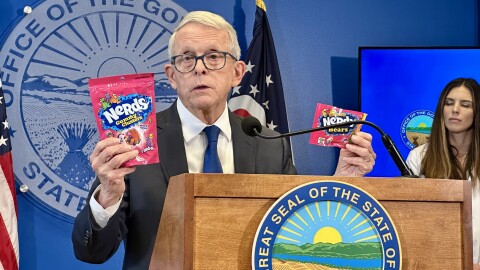Columbus retailers face a ban on intoxicating hemp and THC products after an executive order was issued by Gov. Mike DeWine last week.
Corner stores, beer and wine shops and other businesses have until Tuesday to sell their remaining inventory, per DeWine's emergency declaration. DeWine's order goes into effect at midnight and will last 90 days until it expires.
The ban is aimed at hemp products with psychoactive ingredients, like delta-8 THC and THC-A. These can be THC-infused drunks, gummies or the edibles whose packaging mirrors popular candies.
DeWine criticized the candies and how they target children during a press conference last week.
Aardvark Wine & Beer in the Linworth neighborhood sold the THC drinks to customers, while verifying they are at least 21 years old. These drinks include seltzers, mocktails, sodas, juices, beers and other options.
Donnie Austin, Aardvark's owner, told WOSU DeWine's order caught him off guard, but Aardvark sold all of its THC-drink inventory before DeWine even made the announcement last week. Austin said he posted about the potential ban on Facebook to alert his customers and attempt to sell what he had left in stock.
Austin said the drinks' popularity has risen dramatically and made up about 15% of Aardvark's sales. He said it is particularly popular during 'Dry January' where many people abstain from drinking alcoholic beverages.
"It brought us a lot of customers who either don't drink, so they're new customers for us coming here to buy these products, or our existing customers are buying some of these drinks and maybe have them throughout the week when they don't want to have alcohol," Austin said.
That 15% loss in revenue for at least the next 90 days will be a hit to businesses like Aardvark. A group of business owners sued DeWine over the order the following day, seeking to halt its enforcement.
Austin said some businesses may not be as lucky as his and are scrambling to sell their products before Tuesday.
One business, Columbus Botanical Depot in Clintonville, displays a sign in their window pointing out the difference between CBD products and THC products. Both are derived from cannabis plants, but the effects of the chemicals are different.
CBD products aren't targeted by DeWine's order, which targeted intoxicating hemp products.
Austin agrees there should be limits on the products DeWine is targeting in order to protect kids and to prevent them from buying them. He said he is worried about his own children getting hold of the products.
"They might go to the neighborhood gas station and buy candy occasionally and ride their bikes down there and grab whatever looked like regular candy," Austin said. "I'm not a THC expert and when I see 400 plus milligrams [a package], I don't even know what that would do to me."
Austin said he doesn't agree with DeWine's ban and his customers are unhappy. He suggested that in addition to an age limit to buy these products, the state could require businesses to seek a license akin to what is needed to sell alcohol in Ohio.
'We had to have a permit to sell wine and beer. I don't know why not have that for these types of drinks that are sold in bottle shops and gas stations or whatever like us," Austin said. "We make sure that our customers are 21 years or older when they are buying THC drinks, even though there is no law."
Dan Tierney, a spokesman for DeWine, told WOSU in an email that intoxicating hemp sales practices and marketing practices prior to this executive order conflict with how voters voted on Issue 2 and the highly-regulated market for recreational cannabis.
Tierney pointed out that voters restricted the sale of cannabis, including THC-infused beverages, to dispensaries. Voters also supported making sure packaging and marketing could not be attractive to children.
Tierney said what Austin suggested would be in conflict with Issue 2 cannabis regulations for THC-infused beverages.
"The laws that allow the governor to address this issue only permit him to remove and address unsafe products, in this case products children have access to and have been injured by," Tierney said. "Anything beyond that...such as explicitly permitting sales under specific regulations, would require new legislation."
Tierney said DeWine has requested legislative action, either banning or regulating intoxicating hemp, and looks forward to the Ohio General Assembly continuing to work on such legislation.






